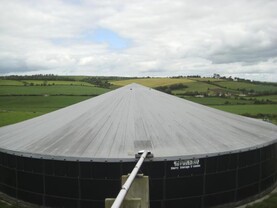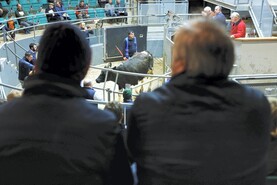A project undertaken by scientists at the Agri-Food and Biosciences Institute (AFBI), which has examined the performance of feed-to-yield systems on 31 local dairy farms, has highlighted the need for farmers to check that feed is being accurately allocated to cows.
As part of the study, which is co-funded by DAERA and AgriSearch, feeder accuracy was examined on 16 of the 31 farms, with a total of 490 individual feeders tested.
The work showed that on seven farms, cows were being underfed, while on the remaining nine farms feeders dropped more concentrates than they were supposed to.
At the extremes, feeders on one farm were offering up to 14% less concentrate than planned, while at the other end, cows were getting an additional 15% of feed.
If this particular farm was feeding 100 cows an average of 6kg per head via in-parlour feeders for a 180-day winter, rather than 108t, the farm would have used 125t of concentrate.
While most farms in the study were within a 5% tolerance on either side, there was also variation found across individual feeders on farms.
On one of the farms a feeder was allocating double the expected amount, while on another, an individual feeder was giving cows 70% less than intended.
The authors of the study recommend that farmers should do a calibration check of all feeders at least once a month, while also recognising that different types of concentrates have different densities, and systems should be recalibrated when rations are changed.
Read more
US dairy farmers to receive $350m in COVID-19 payments for market volatility
Feed additives and methane: can more result in less?
A project undertaken by scientists at the Agri-Food and Biosciences Institute (AFBI), which has examined the performance of feed-to-yield systems on 31 local dairy farms, has highlighted the need for farmers to check that feed is being accurately allocated to cows.
As part of the study, which is co-funded by DAERA and AgriSearch, feeder accuracy was examined on 16 of the 31 farms, with a total of 490 individual feeders tested.
The work showed that on seven farms, cows were being underfed, while on the remaining nine farms feeders dropped more concentrates than they were supposed to.
At the extremes, feeders on one farm were offering up to 14% less concentrate than planned, while at the other end, cows were getting an additional 15% of feed.
If this particular farm was feeding 100 cows an average of 6kg per head via in-parlour feeders for a 180-day winter, rather than 108t, the farm would have used 125t of concentrate.
While most farms in the study were within a 5% tolerance on either side, there was also variation found across individual feeders on farms.
On one of the farms a feeder was allocating double the expected amount, while on another, an individual feeder was giving cows 70% less than intended.
The authors of the study recommend that farmers should do a calibration check of all feeders at least once a month, while also recognising that different types of concentrates have different densities, and systems should be recalibrated when rations are changed.
Read more
US dairy farmers to receive $350m in COVID-19 payments for market volatility
Feed additives and methane: can more result in less?






 This is a subscriber-only article
This is a subscriber-only article










SHARING OPTIONS: